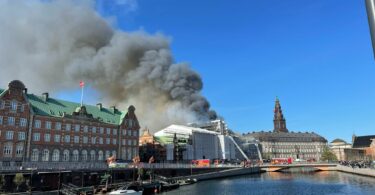
YJI Reporter Rosie Evans, left, conducts an online interview with Julia Samuels in Liverpool, UK. (Rosie Evans/YJI)
Liverpool, ENGLAND – Liverpool has come to a halt. One of the largest cities in the northwest of England with a large proportion of income created by tertiary industries – a bustling and lively place – is now empty and silent.
Since March, galleries, museums, theaters and performance venues have been closed, impacting the livelihoods of thousands of people and devastating the arts community here. Major national tours of musicals and famous musicians were due over the upcoming months but due to covid-19, cancellations are continuing to extend throughout the autumn and winter months. 
This means that box office staff, cast members, crew and theater facilitators don’t know when they will next be receiving a steady income.
Freelance artists are receiving far fewer, if any, commissions. Performers have been working incredibly hard to rehearse for shows that may now never see the light of day.
Festivals and concerts have been postponed, exhibitions have been put on hold and people are understandably very worried.
Julia Samuels, the co-artistic director and chief executive at 20 Stories High, a theater company based in Liverpool, said young people need the arts.
“I think that as human beings we need to be able to think creatively,” said Samuels. “We need creative thinking as we build relationships with other people, as we solve the problems that are thrown at us in our personal lives and in the world more generally.
The education system, she said, doesn’t equip students for that sort of thing.
20 Stories High has been in the process of creating a new show, but all the rehearsals, including weekly sessions with the 25-strong youth theater, have moved online.
The pandemic changed the way things work at 20 Stories High.
“We can’t get in a room together at the moment; and everything we do as theater makers, and as a community is about getting in a room, whether it’s a workshop or whether it’s a show or whether it’s a meeting,” Samuels said. “Thinking about bringing an audience into a theater at the moment feels like – really an impossible thing.”
The future is uncertain for many organizations like this at the moment. Rehearsals and meetings have been moved to Zoom but in the long term, many companies don’t know what life will be like after the lockdown has ended.
“I know that we want to be upbeat, but I’m really, really worried about the arts infrastructure,” said Samuels.
Many smaller organizations were already vulnerable and just holding on, she said.
“I think we’re going to have to totally change how we work and I don’t know what that’s going to look like yet!”
At the National Museums Liverpool, Sandra Penketh, who is executive director of Art Galleries and Collections Care, spoke about the impact of the arts on people in Liverpool.
“I think the key word is positively – and in many different ways,” said Penketh.
Penketh said art helps people find their voice and presents opportunities to create new social circles.
“The experience of visiting a museum or gallery can be really exciting,” Penketh said, adding that for younger children, these places feel safe.
National Museums Liverpool is an organization supported by government funding, so with money being spent on the NHS and other areas at the moment, funding is falling for cultural institutions, according to Penketh.
With no visitors, the financial troubles don’t end with government support, she said. There is also a large dependency on donations.
Asked if she thinks there will be a change in attitude towards arts and culture, especially in a museum or gallery environment, Penketh said, “I think it’s quite hard to second guess at the moment. All the indications are that people will be nervous at first – it might take time to build but it will eventually get back to where it was.”
Visitor make-up may be impacted, Penketh said, with older visitors more anxious about going back into public spaces and numbers of younger visitors potentially rising.
According to Penketh, the disruptions to the arts sector in Liverpool have been massive.
Nobody knows how it will bounce back, or if the next generation of young artists will be discouraged due to the issues and instability highlighted by this crisis.
There will be financial difficulties, job security issues and uncertainty for millions of people. But for many artists, art is more than a job or career. It is a passion and includes a community.
Everyone is impacted by arts and culture in one way or another. Only time will tell if people will give back to it when the arts community is suffering the most.
Even in the darkest moments and longest nights, the show must go on.
Rosie Evans is a Reporter with Youth Journalism International. She is a member of the 20 Stories High youth theater and participated in two of the theater’s shows.


